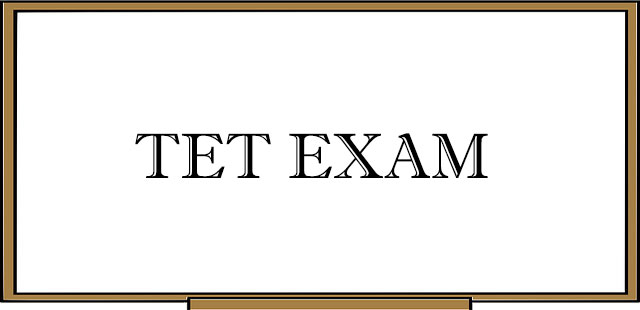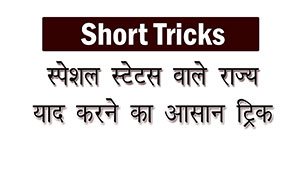-
TET Exam: Syllabus & Preparation Tips
Updated : 17-Nov-2017
Preparation of TET:
Begin the preparation for the exams well in advance. You should be spending the most of your time you have available studying and preparing for the exam. Get the right books to help you study. Apart from your textbooks, read NCERT books from Class 1 to 10. Courses of events are of awesome significance here. The CTET examinations are typically held in February. For scoring admirably, it is simple that you begin preparation early with the goal that you can cover everything and leave adequate time for correction. Characterize courses of events and ensure you stick to them entirely.
- Revision:
At the time of modification, ensure that you concentrate on points you have officially arranged for. Pick the subjects that you are most OK with, and amend them well. Try not to endeavor to take in anything without any preparation right now. It will simply worry you and lessen your certainty
- Focus:
Pedagogy can be your trump card in ensuring achievement. Child Development and required pedagogy of various subjects together comprise about sixty percent of questions. So, if you prepare the pedagogy part well, and answer the questions with around eighty percent accuracy, then you will surely get an excellent score.
- Decide on a test strategy:
Make a decision on your exam attempting strategy prior to the exam. Know your might and weak spots. This will make sure that you don’t go about wasting time with the questions you are unsure of. Focus extra on your sturdy areas and tread carefully with your weak areas. You will then be going into the exam hall with a well chalked out preparation.
- Practice:
It is practice and more practice that will enable you to accomplish flawlessness. Consistent practice raises your level of speed as well as upgrades your exactness level. Speed and precision are the achievement mantras as the inquiries endeavored must be precisely replied, so as to pick up a decent score. Allude to whatever number past inquiry papers as could be expected under the circumstances. That will give you a reasonable picture of what's in store in the exam
- Mock Tests:
There are huge amounts of mock tests accessible on the web. Endeavor to endeavor whatever number as could reasonably be expected. The more you settle the more certain you will get. The mock tests likewise characterize your qualities and shortcomings. You will discover the segments and sort of questions you are most OK with. This will help in evaluating the time and exertion you exhaust regarding each matter. It additionally encourages you dissect and enhance by sending customized test reports through the virtual robot colleague, TIA.
- Stay Stress-Free:
Get enough rest and exercise well. Take general breaks while studying. This will help keep you lose. In spite of the fact that it might entice to continue studying till the latest possible time, you shouldn't over-burden yourself with data just before the exam. Keep in mind; you can't ponder everything at last. Simply experience your amendment notes, unwind and concentrate on comprehending the question paper to the best of your capacity.
TET Syllabus
Subject name
Syllabus
I. Child Development and Pedagogy
a) Child Development (Primary School Child)
§ Concept of advancement and its association with learning
§ Principles of the improvement of youngsters
§ Influence of Heredity and Environment
§ Socialization forms: Social world and youngsters (Teacher, Parents, Peers)
§ Piaget, Kohlberg and Vygotsky: develops and basic points of view
§ Concepts of youngster focused and dynamic instruction
§ Critical point of view of the build of Intelligence
§ Multi Dimensional Intelligence Language and Thought
§ Gender as a social develop; sex parts, sex predisposition and instructive practice
§ Individual contrasts among students, understanding contrasts in view of assorted variety of language, station, sex, group, religion and so forth.
§ Distinction between Assessment for learning and appraisal of learning; School-Based Assessment, Continuous and Comprehensive Evaluation: point of view and practice
§ Formulating suitable inquiries for surveying preparation levels of students; for improving learning and basic speculation in the classroom and for evaluating student accomplishment.
b) Concept of Inclusive education and understanding children with special needs
§ Addressing learners from diverse backgrounds as well as deprived and underprivileged
§ Addressing the requirements of children with education difficulties, ‘impairment’ etc.
§ Addressing the artistic, Creative, Specially abled Learners
c) Learning and Pedagogy
§ How youngsters envision and study; how and why kids 'come up short' to accomplish achievement in school introduction.
§ Fundamental procedures of training and taking in; youngsters' techniques of picking up information; learning as a public movement; societal setting of learning.
§ Youngster as an issue solver and a 'logical specialist'
§ Other originations of learning in youngsters, understanding kids' 'blunders' as imperative strides in the learning procedure.
§ Cognition and Emotions
§ Incentive and learning
§ Factors adding to learning – individual and natural
II. Language I.
a)Language Comprehension which includes Reading unseen passages – 2 passages one prose or drama and one poem with questions on comprehension, inference, grammar and verbal ability (Prose passage may be literary, scientific, narrative or discursive)
b)Pedagogy of Language Development
§ Learning and procurement
- Principles of language Teaching
- Role of tuning in and talking; capacity of language and how kids utilize it as an apparatus
- Critical viewpoint on the part of linguistic use in taking in a language for conveying thoughts verbally and in composed shape
- Challenges of showing language in an assorted classroom; language challenges, mistakes and scatters
- Language Skills
- Evaluating language appreciation and capability: talking, tuning in, perusing and composing
- Teaching-learning materials: Textbook, multi media materials, multilingual asset of the classroom
- Remedial Teaching
III-Language – II
a) Comprehension 2 unseen prose passages (discursive or literary or narrative or scientific) with question on comprehension, grammar and verbal ability
b) Pedagogy of Language Development
§ Learning and acquisition
§ Principles of language Teaching
§ Role of listening and speaking; function of language and how children use it as a tool
§ Critical perspective on the role of grammar in learning a language for communicating ideas verbally and in written form;
§ Challenges of teaching language in a diverse classroom; language difficulties, errors and disorders
§ Language Skills
§ Evaluating language comprehension and proficiency: speaking, listening, reading and writing
§ Teaching – learning materials: Textbook, multi-media materials, multilingual resource of the classroom
§ Remedial Teaching
IV-Mathematics
a)Content
§ Geometry
§ Shapes & Spatial perceptive
§ Solids around us
§ statistics
§ Addition and Subtraction etc.
b) Pedagogical issues
§ Nature of Mathematics/Logical thinking; understanding children’s thoughts and way of thinking patterns and strategies of building meaning and learning
§ Place of Mathematics in Curriculum
§ verbal communication of Mathematics
§ community of Mathematics
§ assessment through formal and informal methods
§ troubles of Teaching
V. Environmental Studies
Content I. Family and Friends: 1.1 Relationships1.2 Work and Play1.3 Animals1.4 Plants. Food III. Shelter IV. Water V. Travel
VI. Things We Make and Do
b) Pedagogical Issues
§ Concept and scope of EVS
§ Significance of EVS, integrated EVS
§ Environmental Studies & Environmental Education
§ Learning Principles
§ Scope & relation to Science & Social Science
§ Approaches of presenting concepts
§ Activities
§ Experimentation/Practical Work
§ Discussion
§ CCE
§ Teaching material/Aids Problems
Aspirants are advised to practice religiously and then this entrance is no big deal. We wish you all the best for your preparation !














